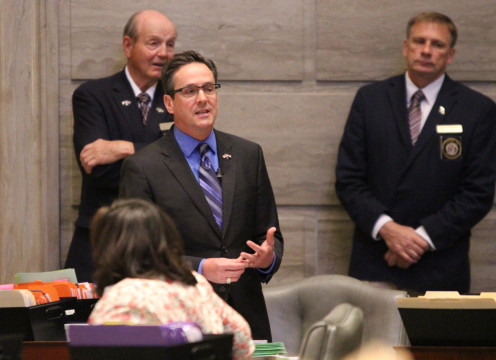JEFFERSON CITY, Mo. – Senate Democrats slowed the senate chamber to a crawl the past week with their opposition to Sen. Kurt Schaefer’s two resolutions that would subpoena officials wrapped up in the Planned Parenthood debate over fetal tissue remains and practices.
The two resolutions passed along party lines Thursday afternoon.

The subpoenas would order Mary Kogut, the president of the Planned Parenthood of St. Louis and Southwest Missouri, and Dr. James Miller of Pathology Services to come before the full Senate to explain why they refused to send in information regarding to subpoenas sent in December by Senate President Pro Tem Ron Richard at the behest of Schaefer. Schaefer chaired the Senate Interim Sanctity of Life Committee which was appointed to investigate the practices and procedures of Planned Parenthood after allegations surfaced that the reproductive health organization was selling fetal tissue for profit.
While Democrats and those on the left have strongly argued that the videos that made the allegations purposefully misrepresented Planned Parenthood, Republicans in both Missouri and Washington D.C. have continued with their investigations into clinic practices.
While the initial resolutions would require the two parties to appear on April 18, Schaefer offered a substitute that would push the date back to April 25, and with their passage, both Kogut and Miller are now expected to appear before the full Senate on that date at 2 p.m.
If they are found in contempt of the subpoena, they could each spend up to ten days in jail and be forced to pay a fine of $300.
“We are deeply disappointed by the Senate’s actions today and we stand firmly by our objections to the Senate subpoena,” Kogut said in a statement. “Our highest priority will continue to be providing quality, compassionate health care to Missourians while protecting patient privacy and adhering to the highest medical and ethical standards.”
Kogut explained that Planned Parenthood’s objection to the subpoena stems from their belief it would require them to turn over patient information. Planned Parenthood, like any other health care provider, has the right to keep privileged patient information confidential under HIPAA regulations. She says the release of any documents is “of serious concern.”
Schaefer, on the other hand, believes Planned Parenthood is engaging in stall tactics.
“There is absolutely nothing that asks for any personally identifiable medical records of anyone,” he said on the floor. “The purpose of why we’re asking is to just remove this veil that if abortions are occurring in the Planned Parenthood in St. Louis, which they are, what’s the process and procedure?
“What we’re trying to figure out is what’s being hidden.”
Senate Democrats railed against the resolutions over the course of the week. Wednesday, Sen. Scott Sifton, D-St. Louis, engaged in a lengthy two-hour debate with Schaefer, dissecting the subpoena line by line. Sen. Jason Holsman, D-Kansas City, accused Schaefer, a candidate for attorney general, of only proposing the legislation to further his political career.
“This is election propaganda at it’s finest,” he said, adding that the bill was “an exercise of Senate authority based on false premise that I believe we wouldn’t be seeing this if the Senator from Boone wanted to seek reelection to their office.
He also indicted term limits as the factor behind what he saw as Schaefer’s increased political pandering.
“I see this as a direct product to not being able to return to this building,” Holsman said. “You stop making the decision’s for the best needs of the Senate and you start making the best decisions for yourself.”
Gov. Jay Nixon demurred on the specifics of the Planned Parenthood case or the resolutions posed against them, but noted that there should be a separation of powers when it comes to law enforcement, especially by the legislative branch.
“The legislature is the most productive when it focuses on legislation as opposed to investigation,” he said. “I would hope as we get in the last month of the session that people’s attention would be focused on issues where we can bring people together.”








